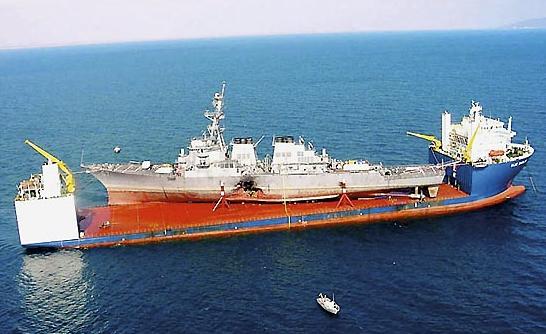 Here is an opportunity to read an Obama Pentagon's tea leaves. Why do this for MarStratMon? Well, a Maritime Strategy is just poorly absorbent toilet tissue without the civilian leaders to support it. On with the show.
Here is an opportunity to read an Obama Pentagon's tea leaves. Why do this for MarStratMon? Well, a Maritime Strategy is just poorly absorbent toilet tissue without the civilian leaders to support it. On with the show.Now and then I provide a translation service. Now is such a time.
First things first. As mentioned here before, the Center for a New American Security is on balance a Democrat holding tank for defense policy wonks. There are some good minds there from Powell to Nagl, but just look around the site to figure it out for yourself. Just understand what CNAS is ... that is all.
From Michèle Flournoy & Shawn Brimley in Defense News we have "Advice to the Next President." The assumption is that it will be a non-SECDEF Gates that will be giving this advice to a Democrat President, but that is OK as long as you understand that - as this advice is about as non-Gates as you can get.
Once you review who Michèle and Shawn are, then I think you are ready to go. Just as a side-note, my antenna always twitch when I see an American with any accent mark over any part of their name - so there is my bias. If you don't get twitchy, then you don't understand the psychology of Harvard types ... but I digress.
Because I, ahem, care-for-the-children, I think I will translate not part but all of the article for you. First lets start with the title;
Advice to the Next PresidentTranslated: What the Democrat Agenda for the Pentagon is once we throw out the Zionist Neo-cons and Rethuglicans.
Now for the rest.
The next U.S. administration will inherit the most daunting national security challenges in generations.Translated: Oh hai! The world is as it always was, but we think you are too ignorant to understand that, so we're going to use a lot of hyperbole to scare you - and pay our dues to the Goracle.
In addition to two ongoing wars in Iraq and Afghanistan, the new president will have to grapple with a long, global campaign against terrorism; continued proliferation of nuclear and other weapons of mass destruction to hostile states and potentially nonstate actors; fundamental shifts in the balance of power, particularly in Asia where China and India are on the rise; increasing competition for and potentially conflict over energy and other resources; the resurgence of a more autocratic and assertive Russia emboldened by petro-wealth; continued globalization but uneven integration, with an increasing potential for state failure; and the consequences of climate change.
What's more, the next administration will have to confront this troubled bequest in a very different budgetary context. Gone are the days of a booming U.S. economy, a $128 billion budget surplus and a Congress that, after 9/11, was willing to write a blank check for national security.Translated: We need to blow our Democrat dog whistle now if you don't mind - some may not have figured it out yet. Just a minute while we bleat out a few talking points that avoid any mention of the Clinton (peas be upon him) Admin. where the economic decline actually started, the costs of being at a war for ~7 years, and the bit that fiscal discipline for us just means cutting the Pentagon budget. There, we're done now.
Instead, the next president will face a U.S. economy sliding toward recession, the retirement of the baby boom generation and burgeoning federal spending on entitlements, a postwar national deficit of $482 billion, a whopping $5.2 trillion in national debt, and a Congress increasingly focused on reining in war spending and restoring fiscal discipline.
As supplemental funding for the Iraq war begins to decline and pressures to reduce federal spending intensify, the DoD budget - which represents the largest portion of U.S. discretionary spending - is likely to experience the makings of a "perfect storm."Translated: I told you now that we are going to gut your budget - so don't say you weren't warned - and don't you dare bring up Carter (Peas be upon him too) ...
Operations and maintenance costs will continue to soar as long as both the tempo of operations worldwide and fuel prices remain high. Personnel costs will continue to skyrocket due to increased health care and pension costs plus the addition of 92,000 personnel to the Army and Marine Corps. Equipment reset costs will almost certainly be more expensive than originally estimated.Translated: First thing is that you need to get small again. We like it much better if you spent what money we do give you on contracts and design work that spends a lot, but produces very little to attack Brown People with. Plenty of money to spread around our so the lobby money comes in, but just enough that it looks like we are doing something - but nothing you can actually use to fight your racist wars with. Zumwalt, Crusader, and Comanche were wonderful programs. We spent billions yet none of it translated into any bit of the American imperialist war machine. Yummy.
And modernization costs will grow as systems reaching obsolescence demand replacement, investment programs continue to experience cost growth, and new capabilities needed for 21st-century missions are identified.
Opening up our strategic aperture while simultaneously tightening our budgetary belts will require the next Pentagon team to make some exceedingly difficult choices about where to prioritize and how to balance risk.
 Translated: Opening up and then tightening down ... Anyway, we would like to put some cheese cloth over out Strategic Aperture. We don't like to clearly focus on real threats - we like to look at broad things we can travel to fun places, stay at nice places like the Rome Cavalieri Hilton and talk about big thoughts that don't require actual action. Much better.
Translated: Opening up and then tightening down ... Anyway, we would like to put some cheese cloth over out Strategic Aperture. We don't like to clearly focus on real threats - we like to look at broad things we can travel to fun places, stay at nice places like the Rome Cavalieri Hilton and talk about big thoughts that don't require actual action. Much better.The first challenge is to allocate risk among current strategic priorities, such as the wars in Iraq and Afghanistan, the global campaign against terrorism, and reducing strains on the U.S. military. The second involves allocating risk when investing in future capabilities. For example, how much emphasis should be placed on developing capabilities for irregular warfare relative to countering high-end asymmetric threats or combating WMD proliferation?Translated: This reality based counter-insurgency stuff is messy and hard. It isn't very sexy either. MRAP or some neat-o-cool-o PPT program? I like the sexy stuff. I like talking about sexy stuff to be produced in the "out years" because out-years means I will be out of office by then and someone else will have to clean up the mess. Someone else will actually have to produce something. This isn't "nextwaritis," oh no. This is "smart thinking," because don't you know - we're smart and therefor know better. I'm smart, you see?
The third challenge is balancing risk between current and future priorities. What resources should be devoted to current operations and maintenance versus investment accounts for new weapons?
Each service faces challenges: The Army and Marine Corps need to determine whether a force expansion plan designed principally to increase dwell times between deployments to Iraq and Afghanistan yields the right mix of capabilities for a future beyond Iraq. The Air Force is experiencing a profound recapitalization crisis after years of prioritizing tactical fighter aircraft modernization. The Navy's recent cancellation of the DDG-1000 class of destroyers underscores the need to connect the demands of the new maritime strategy with a sustainable shipbuilding program.Translated: Army and Marines; don't fall in love with your expanded war machine and cannon fodder. You are scary and need to be shrunk - after all if you are too big, later Rethuglicans might have to use you to clean up our mess. USAF, you need more fighters that are sexy and fewer of those C-thingys that are only good for sustaining American occupying armies enforcing their imperial will on Brown People. Navy, what is your malfunction? I can't make sense of your Maritime Strategy and your inability to produce a ship. You act like LCS and DDG-1000 came out of the last Democrat Pentagon....
Moreover, the new Pentagon team will need to ensure that DoD develops concepts of operations and long-range plans to address emerging missions in new domains, particularly in space and cyberspace. And a rising China, a revanchist Russia, a threatening Iran and an unstable, nuclear-armed Pakistan may require adapting America's global military capabilities and posture.Translated: Enough hard, reality based stuff. Too dirty and bloody and makes for unpleasant PPT slides. Out Pentagon will think long-term because no one else ever does - just as well as we did last time we were in power. Bosnia, Kosovo, Al Qaeda - those were all solved very quickly in the '90s you know. We like computers. There may be something about China, Pakistan and Iran out there that maybe we can use space and computers on .... RUSSIA!!! ... ha ha ha; made you jump!
Most importantly, the new civilian leaders in the Pentagon must adopt an ethic of responsible stewardship that places the need to restore and renew a stressed force on equal footing with the need to make wise choices about how to employ the military. They must be stewards of the institution, not just users of the instrument. Doing so will require them to invest in a healthy civil-military partnership.
 Translated: We don't like all this fighting stuff. If we leave terrorists alone, they will leave us alone; just like they did during the Clinton (PBUH) Administration.
Translated: We don't like all this fighting stuff. If we leave terrorists alone, they will leave us alone; just like they did during the Clinton (PBUH) Administration.Service chiefs will need to live up to their roles as truly joint chiefs, for if each of the services tries to optimize its own narrow interests, they will collectively fall far short of what is needed to protect and advance the nation's interests. Critical to success will be a civil-military team that puts the needs of the nation first and is willing to make the tough tradeoffs necessary to manage a truly daunting defense inheritance.Translated: All you Bushitler Generals and Admirals might as well put in your retirement paperwork. Nation first means we want as much Pentagon money as possible for other pet projects that aren't actually covered by The Constitution - and we want to make the military weak enough that it can't be used for anything larger than Haiti when the next Rethuglican comes into office; if we can't get them outlawed. It almost worked last time, we won't fail this time.
That is the Tough Trade-off part. You need to be tough and do what we stay. The US military is very big, it now knows how to fight 4GW and is positioning itself to be successful in future conflicts. Victory is coming in Iraq. We might just be able to save NATO in AFG -- and another victory.
We just can't have that.
One disclaimer: these folks are good, well intentioned Americans I am sure; they are just wrong. XXOO and all that.
Good people. Good intentions. I know; I know.









1 comment:
spyder ski jackets spyder ski jackets spyder ski jackets [url=http://www.spyder--jackets.com/]spyder jackets[/url] www.spyder--jackets.com
Post a Comment